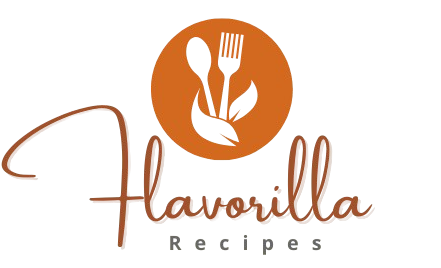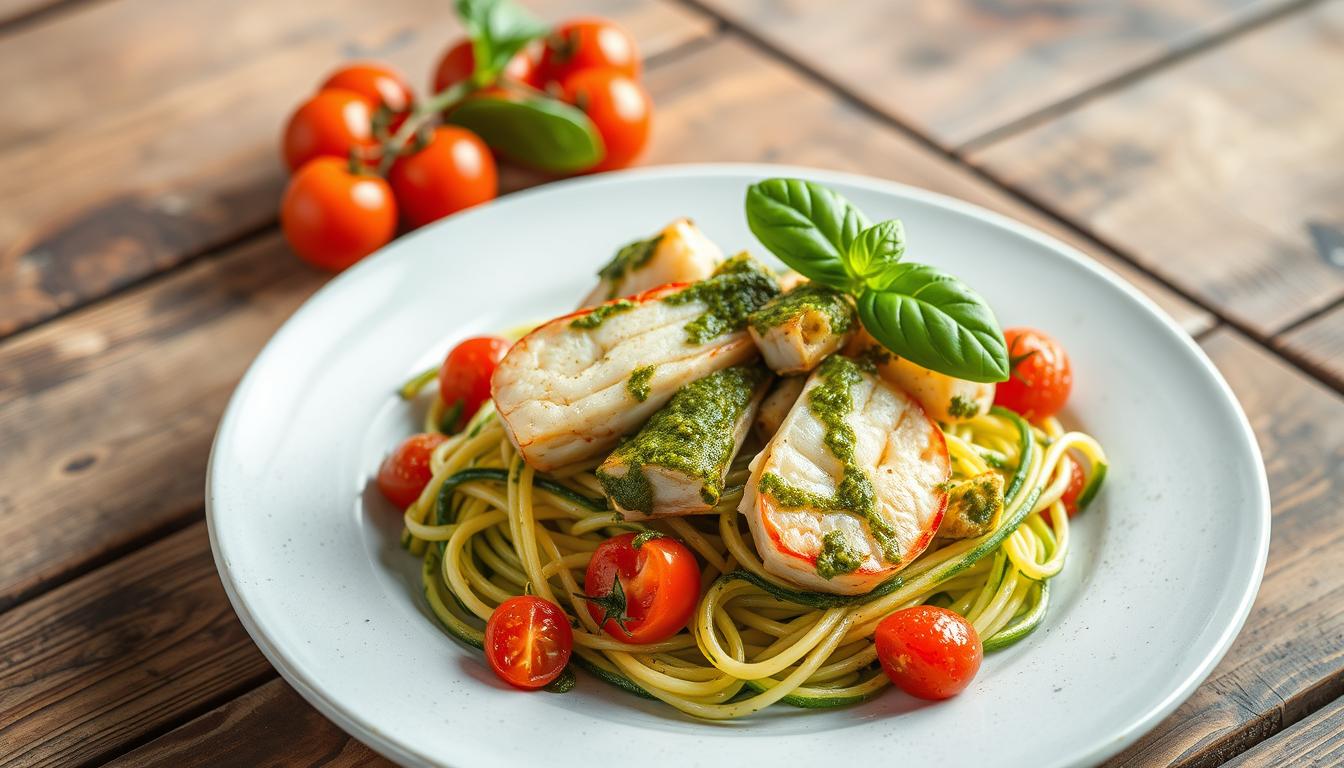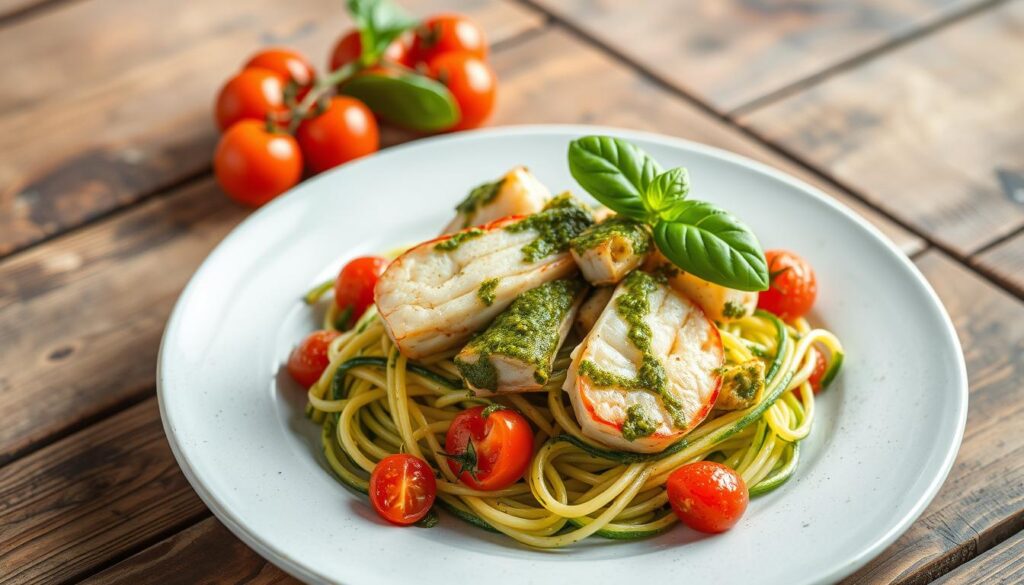
Every home cook dreams of making a meal that makes everyone say “Wow!” Pesto langostino zucchini and pasta recipes can do just that. They turn simple ingredients into something amazing. Imagine making a dish with langostino, pesto, and zucchini in your kitchen. It’s a culinary adventure.
Cooking is more than just feeding people. It’s about making memories. These recipes do more than feed your family. They bring everyone together, start conversations, and make your home feel like a restaurant.
- Understanding Langostino: The Perfect Seafood for Pasta Dishes
- Essential Ingredients for Perfect Pesto Langostino Zucchini and Pasta Recipes
- Mastering the Art of Homemade Pesto Sauce
- Preparing Zucchini for Pasta Dishes: Tips and Techniques
- Step-by-Step Guide to Creating Zucchini Pasta with Pesto Sauce
- Combining Flavors: How to Balance Pesto, Seafood, and Vegetables
- Quick and Easy Pesto Langostino Zucchini and Pasta Recipes
- Wine Pairing Suggestions for Your Seafood Pasta Creation
- Seasonal Variations and Ingredient Substitutions
- Plating and Presentation Tips for Restaurant-Style Results
- Troubleshooting Common Recipe Issues
- Conclusion
Understanding Langostino: The Perfect Seafood for Pasta Dishes
Seafood fans looking to spice up their zucchini pasta with pesto sauce will love langostino. This small crustacean is a mix between shrimp and lobster. It’s perfect for adding a unique twist to pasta dishes.
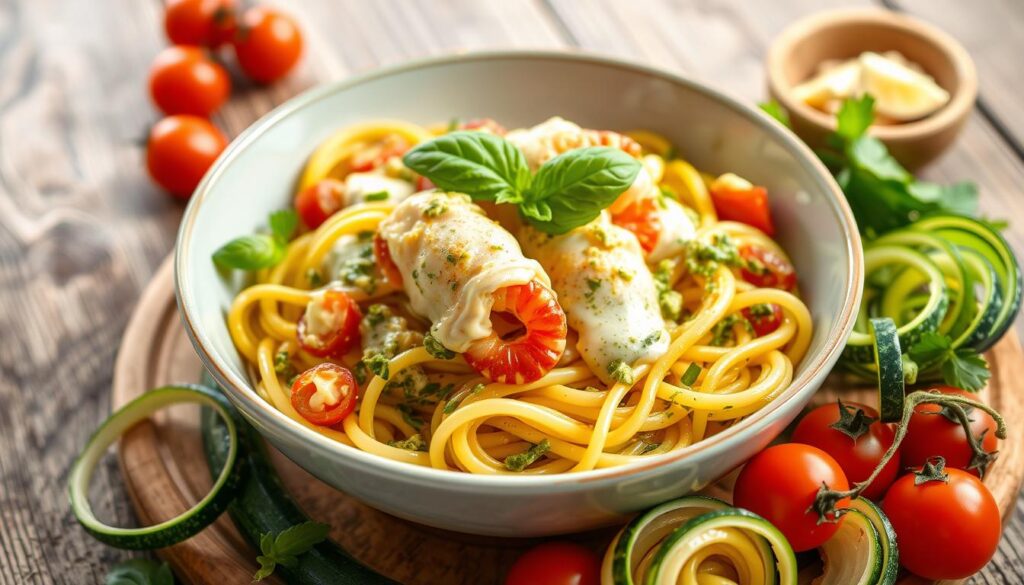
Differences Between Langostino and Traditional Lobster
Langostino is quite different from regular lobster. It’s smaller, has a softer texture, and tastes sweeter. These traits make it a great choice for creative pasta recipes.
Nutritional Benefits of Langostino
Adding langostino to your zucchini pasta with pesto sauce boosts its nutritional value. It’s packed with:
| Nutrient | Amount per 3 oz Serving |
|---|---|
| Protein | 16 grams |
| Calories | 80 |
| Omega-3 Fatty Acids | 0.5 grams |
Where to Source Quality Langostino
Finding top-notch langostino takes some effort. Here are the best places to look:
- Specialty seafood markets
- Online gourmet seafood retailers
- Well-stocked grocery stores with extensive seafood sections
“Langostino brings a touch of elegance to everyday pasta dishes.” – Culinary Experts
When picking langostino for your zucchini pasta with pesto sauce, choose fresh and sustainable options. This will make your dish even more special.
Essential Ingredients for Perfect Pesto Langostino Zucchini and Pasta Recipes
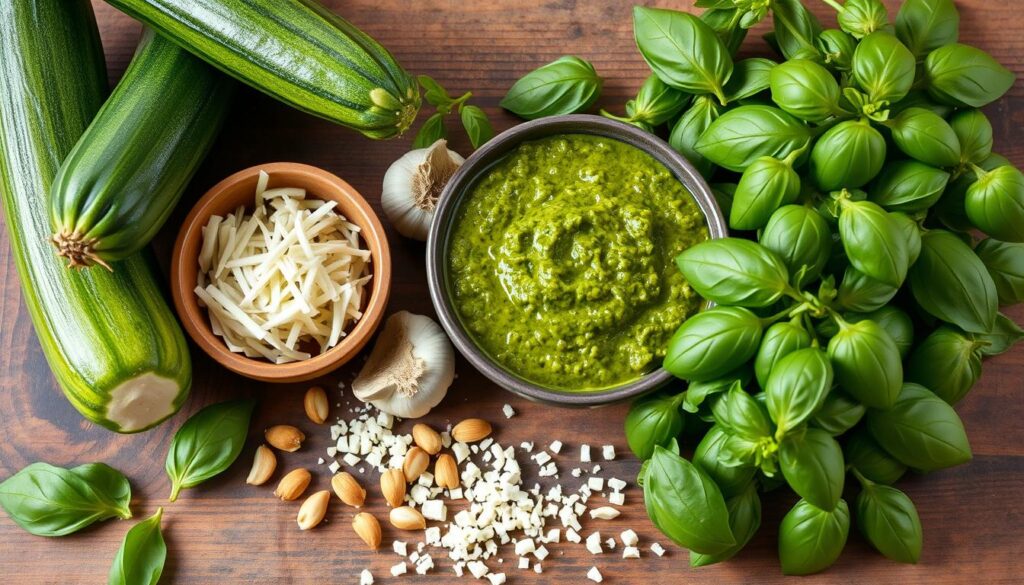
Making a great zucchini pesto pasta starts with picking the right ingredients. These ingredients should blend well together. This way, they enhance the dish’s taste.
“Great cooking starts with great ingredients” – Chef Mario Batali
Key Ingredients for Zucchini Pesto Pasta
- Fresh basil leaves
- Extra virgin olive oil
- Pine nuts or walnuts
- Parmesan or Pecorino Romano cheese
- Fresh langostino
- Zucchini
- High-quality pasta
When picking ingredients, look for freshness and quality. The right mix can turn a simple dish into a gourmet delight.
Ingredient Quality Breakdown
| Ingredient | Quality Indicators | Recommended Type |
|---|---|---|
| Basil | Bright green, fragrant | Sweet Genovese basil |
| Olive Oil | Cold-pressed, fruity aroma | Extra virgin, Italian |
| Langostino | Fresh, firm texture | Wild-caught, sustainably sourced |
| Zucchini | Firm, vibrant color | Organic, local when possible |
Using the best ingredients will make your zucchini pesto pasta stand out. Each part is important for a dish that’s unforgettable.
Pro Tips for Ingredient Selection
- Choose seasonal zucchini for maximum flavor
- Toast nuts before adding to pesto
- Use freshly grated cheese
- Select pasta with good sauce-holding capabilities
By picking the right ingredients, you’ll make a zucchini pesto pasta that everyone will love.
Mastering the Art of Homemade Pesto Sauce
Making the perfect pesto zucchini sauce is like a work of art. It turns simple ingredients into a dish that’s truly special. Whether you’re new to cooking or have lots of experience, making your own pesto can add fresh, exciting flavors to your meals.
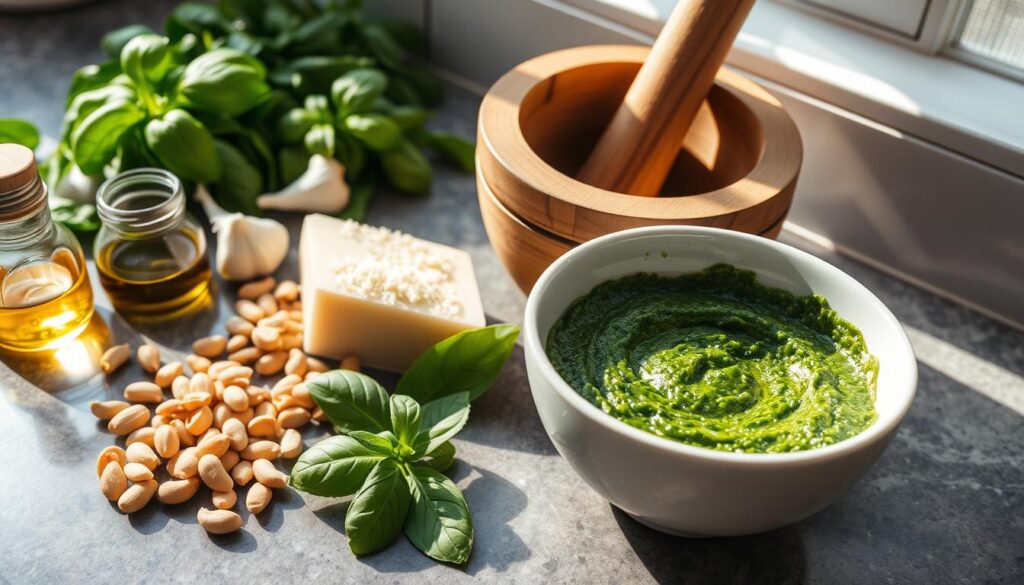
Pesto is more than just a sauce. It’s a way to celebrate fresh ingredients and bold tastes. The traditional Genovese pesto comes from Liguria, Italy. But today, there are many new and creative ways to make pesto.
Traditional vs Modern Pesto Variations
- Classic Genovese: Basil, pine nuts, garlic, olive oil, Parmesan cheese
- Modern Twists:
- Kale and walnut pesto
- Spinach and almond pesto
- Sun-dried tomato pesto
Storage Tips for Fresh Pesto
To keep your homemade pesto zucchini sauce fresh, you need to store it right. Put it in an airtight container and cover it with a thin layer of olive oil. This keeps it from getting old too fast. Pesto stays good in the fridge for 5-7 days.
Common Pesto-Making Mistakes to Avoid
- Overheating ingredients – destroys delicate flavors
- Using dull blades – prevents smooth texture
- Skipping fresh ingredients – compromises taste
“The secret to great pesto is using the freshest ingredients and handling them with care.” – Italian Chef Giuseppe Rossi
With a bit of practice, you’ll get really good at making pesto that’s just like what you’d find in a restaurant. Your family and friends will love it.
Preparing Zucchini for Pasta Dishes: Tips and Techniques
Learning how to prepare zucchini can make your pasta with zucchini and pesto stand out. It’s all about the right cutting techniques. These techniques boost both flavor and texture.
For zucchini in pasta dishes, you’ll need to try different preparation methods:
- Spiralizing for light, noodle-like strands
- Julienning for delicate, thin strips
- Dicing for chunky, rustic presentations
Pro tip: Always remove excess moisture from zucchini before cooking. This prevents your pasta from becoming soggy. A quick salt and pat-dry method works great.
“The secret to perfect zucchini is understanding its water content and managing it skillfully.” – Professional Chef
Cooking zucchini at the right temperature is crucial. High heat keeps it crisp and prevents it from becoming mushy. Try quick sautéing or roasting at 400-425°F. This helps keep the flavor in and prevents it from getting too wet.
Seasoning zucchini can make a big difference. Here are some tips to enhance its flavor:
- Lightly salt before cooking
- Use fresh herbs like basil
- Incorporate garlic or shallots
Remember, the more you practice, the better you’ll get. Each time you prepare zucchini, you’ll become more confident and skilled in making delicious pasta dishes.
Step-by-Step Guide to Creating Zucchini Pasta with Pesto Sauce
Turning zucchini into tasty pasta is an art. It can make your squash pasta pesto dish stand out. With the right steps, you’ll make a healthy and tasty meal that will wow everyone.
Making perfect zucchini noodles takes skill and the right tools. Let’s dive into how to make your pesto pasta a hit!
Spiralizing Techniques for Perfect Zucchini Noodles
To get restaurant-quality zucchini pasta, follow these tips:
- Choose firm, medium-sized zucchini for best results
- Wash and dry zucchini thoroughly before spiralizing
- Use a sharp spiralizer with multiple blade options
- Apply consistent pressure while spiralizing
- Trim long noodles for easier eating
Cooking Times and Temperature Guidelines
Getting the cooking right is key for perfect squash pasta pesto. Overcooking can make your zucchini noodles mushy.
| Cooking Method | Time | Temperature |
|---|---|---|
| Raw | 0 minutes | Room temperature |
| Sautéed | 2-3 minutes | Medium-high heat |
| Blanched | 1 minute | Boiling water |
Pro tip: Pat zucchini noodles dry after cooking to prevent watery pesto sauce!
“The secret to great zucchini pasta is gentle cooking and fresh ingredients.” – Chef Maria Rodriguez
With these tips, you’ll make a stunning squash pasta pesto dish. It’s healthy and delicious. Remember, practice makes perfect, so don’t worry if it’s not perfect at first!
Combining Flavors: How to Balance Pesto, Seafood, and Vegetables
Making pesto langostino zucchini and pasta recipes is all about balance. It’s about knowing how flavors work together. You want a dish where every ingredient is in harmony.
First, think about what each part brings to the table:
- Pesto: Rich and full of herbs, with strong basil and garlic
- Langostino: Sweet and delicate, with a hint of the sea
- Zucchini: Light and fresh, with a touch of earthiness
To get the flavors right in your pasta, try these tips:
- Make pesto less intense by adding a bit of olive oil or cream
- Lightly cook langostino to bring out its sweetness
- Season zucchini with salt before cooking to remove extra moisture
“The art of cooking is about creating harmony on the plate” – Chef Julia Child
When mixing pesto, langostino, zucchini, and pasta, play with seasonings. A bit of red pepper flakes can add spice, while lemon zest can make it bright. Listen to your taste and adjust until it’s just right.
Quick and Easy Pesto Langostino Zucchini and Pasta Recipes
Busy weeknights need fast, tasty meals. Zucchini pasta with pesto sauce is perfect for quick, healthy dinners that taste great.
Creating a delicious meal doesn’t take all day. With some smart prep and shortcuts, you can make zucchini pasta with pesto sauce faster than ordering takeout.
30-Minute Weeknight Version
Change your dinner routine with this quick recipe. It’s packed with flavor and easy to make:
- Spiralize fresh zucchini noodles in under 5 minutes
- Use pre-made pesto sauce to cut preparation time
- Quickly sauté langostino for protein-packed goodness
- Combine ingredients and serve immediately
Make-Ahead Preparation Options
Meal planning is a big help for busy families. Try these smart prep tips:
- Spiralize zucchini noodles up to 24 hours in advance
- Prepare pesto sauce and store in an airtight container
- Pre-cook langostino and refrigerate until needed
“Delicious meals don’t have to be complicated. With the right techniques, you can create restaurant-quality dishes in your own kitchen.” – Culinary Expert
Your zucchini pasta with pesto sauce can wow both family and guests. The secret is in the prep and choosing the right ingredients.
Wine Pairing Suggestions for Your Seafood Pasta Creation
Finding the perfect wine for your zucchini pesto pasta can make your meal special. The right wine brings out the flavors of langostino and the pesto’s herbs.
White wines are usually the best choice for seafood pasta. Here are some great wines for your dish:
- Sauvignon Blanc: Its crisp, herbaceous taste matches the pesto’s green notes
- Pinot Grigio: A light-bodied wine that won’t overwhelm the seafood
- Vermentino: Its mineral profile boosts the seafood’s flavors
When picking a wine, keep these tips in mind:
| Wine Type | Flavor Profile | Best Matched With |
|---|---|---|
| Sauvignon Blanc | Crisp, herbal | Pesto-based dishes |
| Pinot Grigio | Light, refreshing | Delicate seafood |
| Vermentino | Mineral, citrusy | Zucchini pasta |
Pro tip: Serve your wine slightly chilled to enhance its refreshing qualities and complement the zucchini pesto pasta’s flavors.
“Wine is the perfect companion to great food – it doesn’t just accompany the meal, it completes it.” – Unknown Sommelier
If you’re watching your budget, you can find great wines for $10-$20. They’ll pair perfectly with your seafood pasta. Feel free to try different wines and find your favorite!
Seasonal Variations and Ingredient Substitutions
Cooking with pesto zucchini lets you get creative all year. You can change up your favorite recipe with simple swaps and seasonal tweaks. Whether it’s summer’s bounty or winter’s sparse offerings, these tips will keep your meals fresh and tasty.
Seasonal changes offer new chances to make your pesto zucchini dishes stand out. Here’s how to make your recipe shine in every season:
Summer Adaptations
- Use fresh, locally grown zucchini from farmers markets
- Incorporate colorful heirloom tomatoes
- Add fresh basil leaves directly from your garden
- Experiment with lighter, citrus-infused pestos
Winter Alternatives
- Roast zucchini before adding to enhance flavor
- Use dried herbs for pesto base
- Add robust winter squash to complement zucchini
- Include toasted nuts for extra warmth
Vegetarian and Vegan Options
| Original Ingredient | Vegetarian Substitute | Vegan Substitute |
|---|---|---|
| Langostino | Grilled halloumi cheese | Marinated tofu |
| Parmesan in Pesto | Nutritional yeast | Cashew-based cheese |
| Traditional Pesto | Spinach-based pesto | Kale and sunflower seed pesto |
Pro tip: Always taste and adjust seasonings when making substitutions to ensure your dish remains delicious!
“Cooking is about flexibility and creativity. Don’t be afraid to experiment with your pesto zucchini recipe!” – Chef Maria Rodriguez
Plating and Presentation Tips for Restaurant-Style Results
Making a beautiful pasta with zucchini and pesto dish is more than just about taste. It’s an art that chefs master. They know that how it looks can turn a simple meal into a special experience.
When you’re making your pasta with zucchini and pesto, remember these presentation tips:
- Choose white or neutral-colored plates to make colors pop
- Create height by twirling pasta carefully
- Use fresh herb garnishes for vibrant visual interest
- Play with color contrast using green pesto and bright zucchini
Plating can make your homemade meal look like it’s from a restaurant. Try these pro tips:
- Use tongs to create spiral pasta mounds
- Drizzle extra pesto around the plate’s edge
- Sprinkle toasted pine nuts for texture
- Add microgreens for sophisticated presentation
“Great food is about creating an experience, not just filling a plate.” – Renowned Chef Marcus Samuelsson
With these easy presentation tricks, your pesto zucchini pasta will look as good as it tastes.
Troubleshooting Common Recipe Issues
Cooking squash pasta pesto can sometimes be tricky. But, every home chef faces recipe problems. Let’s look at common issues and how to fix them to make a great meal.
Zucchini Noodle Moisture Problems
Too wet zucchini noodles can mess up your pesto pasta. Here’s how to avoid it:
- Salt zucchini noodles and let them sit for 10 minutes
- Pat noodles dry with paper towels
- Use a spiralizer to create thin, uniform noodles
Langostino Cooking Challenges
Overcooking seafood can make it tough and rubbery. To keep langostino tender, follow these tips:
- Cook langostino for 2-3 minutes maximum
- Use medium-high heat
- Remove from heat immediately when color changes
For a smooth pesto sauce, try this troubleshooting guide:
| Issue | Solution |
|---|---|
| Separated Pesto | Whisk in a tablespoon of warm water |
| Bitter Taste | Add a pinch of salt or small amount of cheese |
| Too Thick | Gradually add olive oil while stirring |
“Cooking is about confidence and creativity – don’t let small setbacks discourage you!” – Professional Chef
Remember, practice makes perfect when preparing squash pasta pesto dishes. Each attempt brings you closer to culinary mastery!
Conclusion
Your journey into pesto langostino zucchini and pasta recipes has opened a world of tasty possibilities. You’ve learned how to make homemade pesto and use langostino. These skills turn simple meals into special dining moments.
Every recipe you’ve tried is more than just food. It’s a chance to show your creativity in the kitchen. Zucchini noodles, pesto, and seafood come together to make meals that wow everyone. Now, you can try new things and make dishes your own.
Cooking is an exciting journey, and these recipes are your guide. They help you make quick dinners or fancy meals. You’ll get better at cooking and making food that’s both healthy and delicious.
Your kitchen is like a canvas, and these recipes are your brushstrokes. Start cooking with excitement and enjoy every bite of your seafood pasta.
FAQ
What exactly is langostino?
Langostino is a crustacean often mistaken for lobster. It tastes sweet and delicate, like lobster. But it’s more like hermit crabs. Its tender meat is perfect for pasta, offering a luxurious taste without lobster’s high cost.
Can I make this recipe vegetarian?
Yes! You can swap langostino for tofu, chickpeas, or mushrooms. Add pine nuts or nutritional yeast for extra flavor.
How long can I store homemade pesto?
Homemade pesto lasts 5-7 days in the fridge. Cover it with olive oil to keep it fresh. Freeze it in ice cube trays for up to 3 months for easy use.
What’s the best way to prevent zucchini noodles from becoming watery?
Salt zucchini noodles after spiralizing and let them sit for 15 minutes. Then, dry them with paper towels. You can also sauté or use them raw for a crisp texture.
Can I use frozen langostino instead of fresh?
Yes, frozen langostino is great! Thaw and pat dry before cooking. It’s as tasty as fresh and more convenient. Just don’t overcook it to avoid toughness.
What wine pairs well with this dish?
Pinot Grigio or Sauvignon Blanc pairs well with this dish. They match the seafood and basil without overpowering. A lightly oaked Chardonnay is also a good choice.
How can I make this recipe gluten-free?
Use gluten-free pasta like zucchini noodles or rice noodles. Make sure your pesto ingredients are gluten-free. Most pesto ingredients are naturally gluten-free, but check your ingredients.
